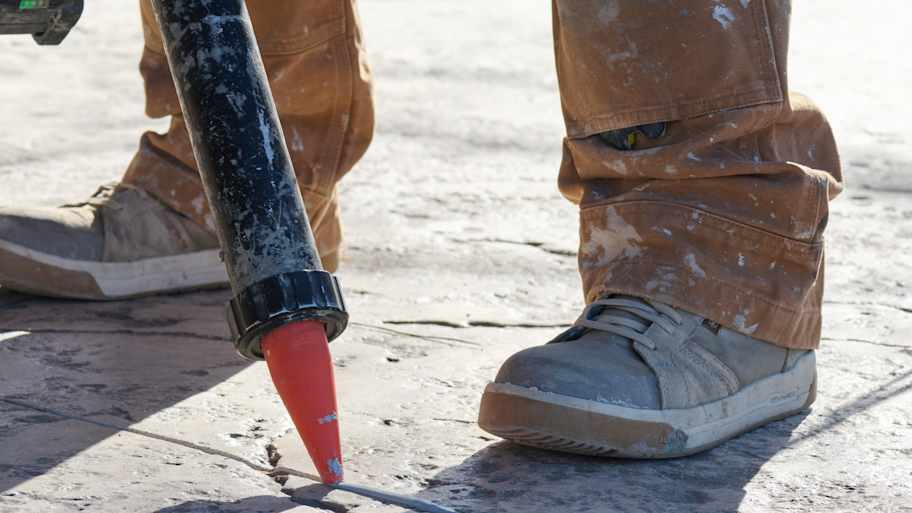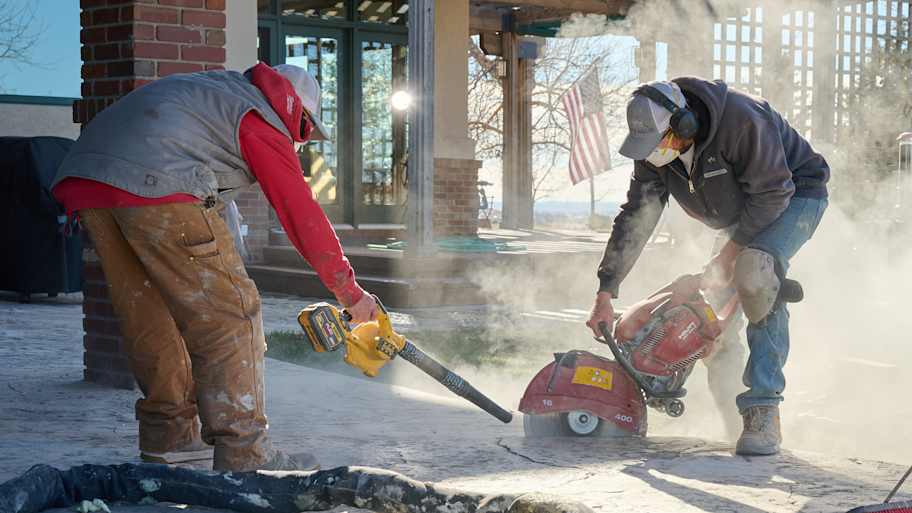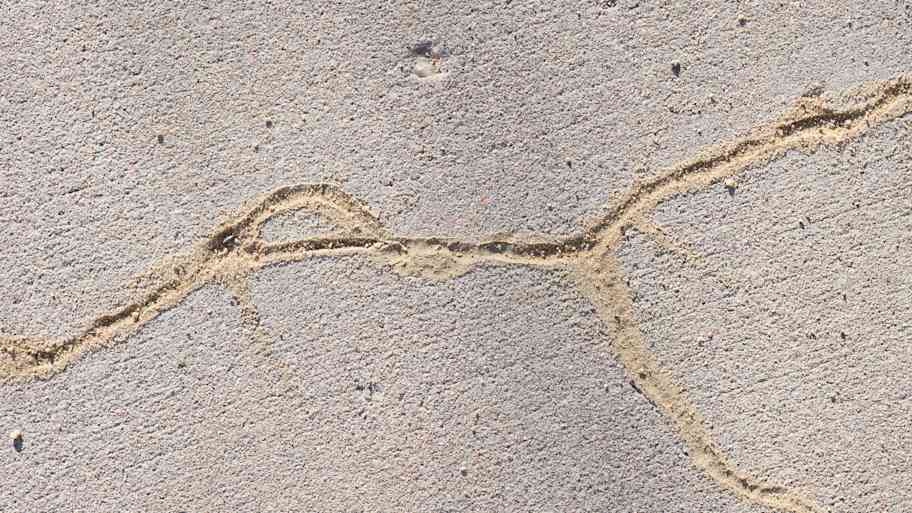2025 Concrete Steps Cost: Poured and Precast
Concrete steps cost an average of $3,500, with most homeowners paying between $600 and $5,000, depending on the size, type, and location of the steps.


Installing concrete steps costs $3,500 on average, although you could pay anywhere between $400 and $6,000. Your total project cost will depend on the type and size of the steps, the quality of the material, where the steps are located, and more. A new set of concrete steps will add curb appeal and allow you and your guests to access your home safely. We broke down the factors that affect how much you’ll pay for concrete steps so you can budget for this project.
Concrete Step Cost Factors
The cost of a concrete stoop or exterior basement steps can range from around $1,000 to $6,000. The range is so large because there are a handful of cost factors to consider that can bring your total well above or below the average.
Size
Concrete steps that are 4 feet wide cost between $200 and $600 per step, with prices increasing with the step’s width. Poured concrete steps fall on the higher end of these costs since they require more on-site labor. The number of steps you need will also affect the total size of your staircase and the final cost.
| Step Width (Feet) | Average Cost per Step |
|---|---|
| 3 | $150–$450 |
| 4 | $200–$600 |
| 5 | $250–$750 |
| 6 | $300–$900 |
Concrete Quality
The quality of concrete will affect your budget. A low-grade set of concrete steps can cost $400, while high-quality concrete steps cost about $800 on average. Higher-quality materials cost more upfront, but they tend to last longer and will likely require fewer concrete step repairs as they age. Ultimately, paying more up front could save you money down the road.
Solid vs. Hollow Steps
Solid concrete steps cost around $600 per step, and your contractor will pour them in place. They are solid, which means they’re stronger and more durable. Hollow steps, including most precast steps, cost around $200 per step and come from an off-site manufacturer before your contractor installs them. Precast solid steps often aren’t an option.
Coatings
A coating will make your steps more visually appealing and durable and improve slip resistance. Some precast staircases come with existing stone treads, which add about $100 to $500 to your cost for a standard four- to six-step concrete staircase. Alternatively, you can pay for a concrete coating at about $200 to $400 per staircase.
Staircase Features
Staircase features can make your steps safer, more functional, and more decorative, but they will bump up your total installation price.
| Feature Type | Specifics | Average Cost |
|---|---|---|
| Railings | Wood or metal | $300–$600 |
| Concrete sealer | Acrylic, epoxy, or polyurethane | $200–$400 |
| Step risers | Custom height | $0–$400 |
Permits
You may need a building permit to install concrete steps, depending on local regulations. Building permits can range between $100 and $1000, and failure to get a permit where required can result in fines, citations, or even having to remove the steps after installation. Check with your local building authority to see if you need a permit.
Removal of Old Concrete or Materials
Removing concrete stairs ranges between $200 and $400, or $2 to $6 per square foot, depending on whether your contractor reinforces the material with wire mesh or steel bars. It’s easier and more cost-effective to take out unreinforced material without heavy machinery.
If you’re removing wooden stairs and replacing them with concrete, you can likely dispose of the material yourself, or you can pay a professional around $100 to disassemble and remove it for you.
Concrete Delivery
Concrete delivery can average between $100 and $300, but the concrete delivery cost is usually on a per-yard basis and can vary greatly based on staircase size. Check with the concrete company to confirm delivery fees.
Labor
Expect to pay between $600 and $1600 for labor to install concrete steps, depending on the size and type of steps being installed. A local concrete patio contractor can provide an accurate labor estimate for your project.
Location
The total price for installing concrete steps depends on where you place these steps on the exterior of your home and how easy it is for laborers and machinery to reach the area. The area also determines how many steps you’ll need and which additional features, if any, are desired, which will directly affect pricing.
Basement Stairs
Exterior steps leading to your basement cost between $1,500 and $5,000, including installation. Indoor concrete stairs in the basement will likely be a little more expensive, as working in tight spaces will make the installation more challenging for your installer.
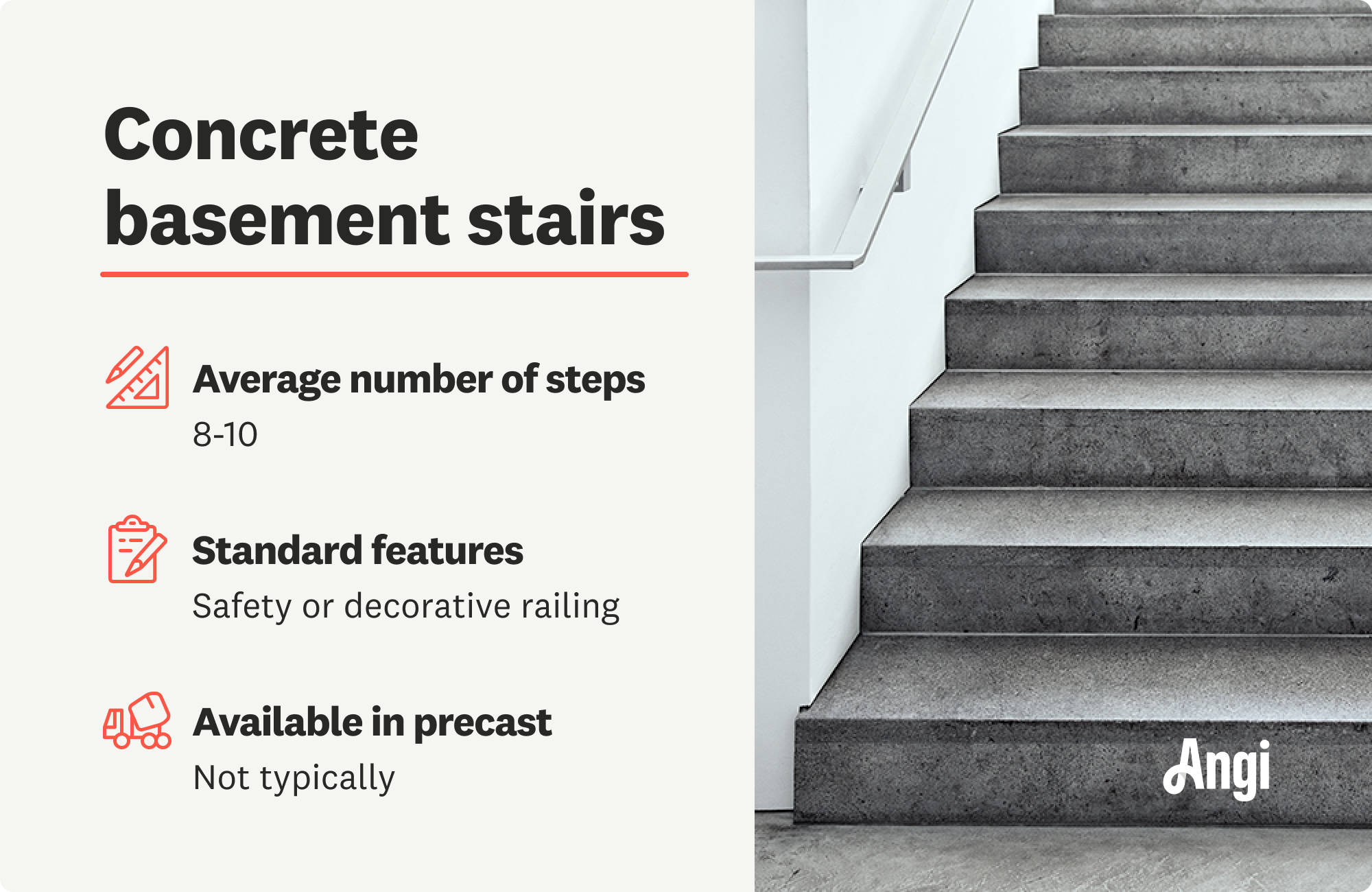
Front Stairs or Rear Stairs
Concrete stairs are popular choices for leading up to your home’s entryways, thanks to their durability and modern appearance. A standard set of entryway concrete steps costs between $800 and $2,400 for the concrete alone. Most homeowners will also want a decorative handrail on their front entryways, which will bring the total up to between $1,000 and $3,000.
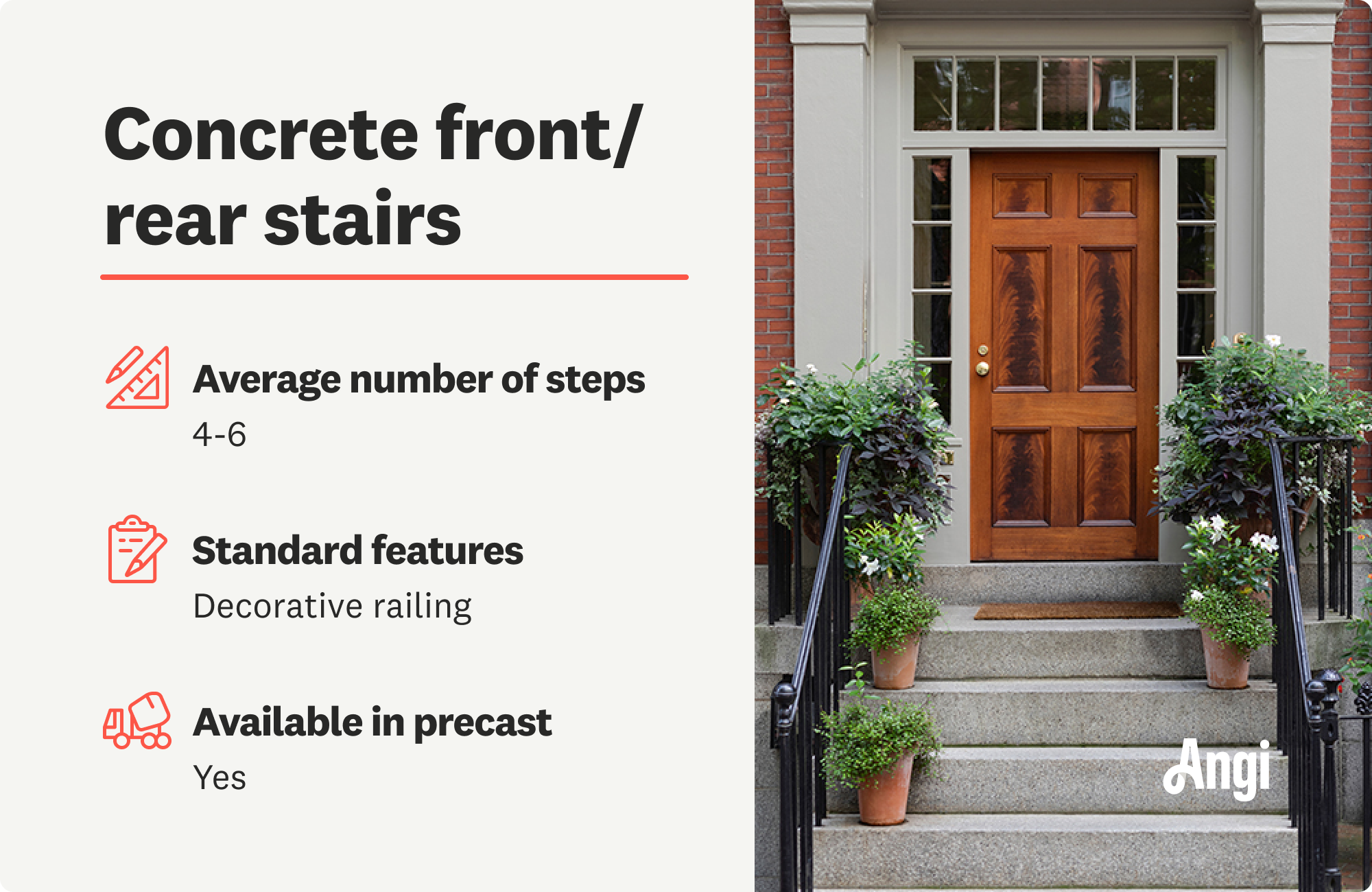
Landscape Stairs
If you just need a few steps—between three and five—for your landscaping, you’ll pay between $600 and $3,000 in most cases. The more steps you add, the higher the cost. Additionally, landscape stairs that sit between sections of the yard or concrete walkways are more likely to have longer step runs (the part you step on) than stairs that connect to your home. Longer runs can push your installation price higher.
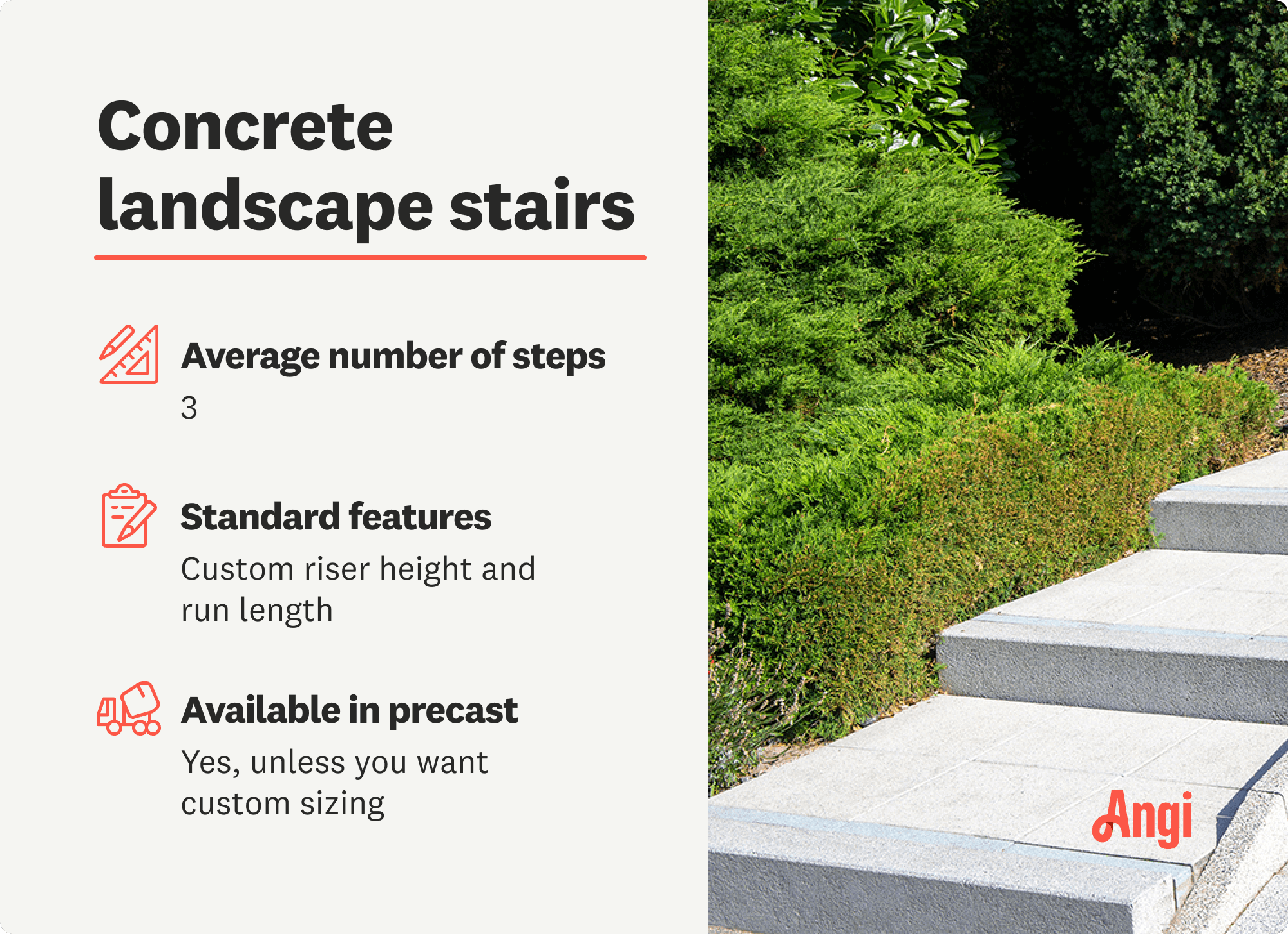
Maintenance and Repairs
Keeping your steps free of stains, small cracks, and surface debris is relatively affordable, with concrete cleaner costs ranging from $15 to $20 per gallon and $0.10 to $0.50 per square foot for pressure washing. When it comes to concrete step repair, the cost can be as little as $20 or upward of $750. Smaller repairs can be a DIY project for handy homeowners, but for larger or structural repairs, you’ll want to hire a contractor who repairs concrete steps to ensure the job is done safely and up to code.
| Repair Type | Average Cost |
|---|---|
| Small crack filling | $20–$100 |
| Patching larger cracks | $50–$300 |
| Resurfacing | $200–$500 |
Cost of Poured vs. Precast Concrete Steps

When installing a concrete staircase, you can either pour your own concrete or opt for precast concrete steps. The method you choose affects what you’ll pay, since there’s less labor involved in installing precast steps.
| Poured Concrete Steps | Precast Concrete Steps |
|---|---|
| $1,800–$6,000 | $600–$2,000 |
| Requires on-site mixing, pouring, and finishing | Steps are prefabricated and only require installation |
| Highly customizable | Limited customization |
| Long curing time | No curing time needed, allowing for faster project completion |
DIY vs. Hiring a Pro to Install Concrete Steps
The average material cost to build your own concrete steps is between $400 and $3,200, ranging from a three-step staircase to a full eight-step one leading down to a basement. If you’re up for the challenge (a big challenge), you’ve got a weekend to spare, and you know how to mix concrete and construct molds, you could stand to save an average of between $200 and $1,600 on your concrete step project.
That said, we advise you to consider this DIY carefully. Pouring concrete steps isn’t the best job for a DIYer, especially if you don’t know how to prep the site and ensure the concrete steps are safely and structurally supported. We strongly recommend you hire a concrete company near you to get the job done safely and with proper permits. Hiring a concrete contractor will ensure the steps meet all local building codes and that the concrete is mixed, poured, and cured correctly.
| Concrete Steps | Average Price for Materials/DIY Installation | Average Price for Materials/Pro Installation |
|---|---|---|
| 3 Steps, Precast | $400 | $600 |
| 3 Steps, Poured (Custom) | $1,200 | $1,800 |
| 4 Steps, Precast | $560 | $800 |
| 4 Steps, Poured (Custom) | $1,600 | $2,400 |
| 5 Steps, Precast | $650 | $1,000 |
| 5 Steps, Poured (Custom) | $2,000 | $3,000 |
| 6 Steps, Precast | $800 | $1,200 |
| 6 Steps, Poured (Custom) | $2,400 | $3,600 |
| Full Basement Staircase, Precast | $1,100 | $1,600 |
| Full Basement Staircase, Poured (Custom) | $3,200 | $4,800 |
Always put on protective clothing before working with concrete, as it can cause chemical burns. Make sure to wear long sleeves, pants, waterproof gloves, safety goggles, and a face mask.
Tips to Save Money on Concrete Step Costs
Installing new concrete steps outside your home is a relatively affordable way to improve your home’s curb appeal and make your home’s entrances safer. Still, there are some ways you can save on the installation to keep material and labor prices as low as possible.
Choose precast steps, if possible: Precast steps cost about a third of the price of poured concrete, largely because they are mass-manufactured, which cuts down on labor and material costs. You’ll pay for a premade staircase delivery, but you’ll still save quite a lot overall.
Install more affordable railings: Decorative railings are desirable on concrete steps, especially for those leading to the front of your home. You can save money by going with standard designs or by installing a wall-mounted railing rather than a free-standing one, where it’s plausible.
Stick to standard step sizes: Custom stair sizes and shapes will always be more expensive than standard ones. For precast stairs, manufacturing costs can easily double or triple if you want a custom design, and some companies won’t even be able to accommodate you. For poured concrete, building custom molds to your specifications will take longer and drive up your labor costs.
Hire a pro: Hiring a concrete contractor costs more upfront than a DIY concrete stairs installation, but it can save you more in the long run by avoiding costly mistakes. Poured concrete steps are heavy and can sink into the soil if not prepped or constructed properly. You could also risk damaging your home if they affect the soil around your foundation.
How Angi Gets Its Cost Data
Home is the most important place on earth, which is why Angi has helped more than 150 million homeowners transform their houses into homes they adore. To help homeowners with their next project, Angi provides readers with the most accurate cost data and upholds strict editorial standards. We extensively research project costs to develop the pricing data you see, so you can make the best decisions for you and your home. We rely on reputable sources, including the U.S. Bureau of Labor Statistics, academic journals, market studies, and interviews with industry experts—all to ensure our prices reflect real-world projects.
Want to help us improve our cost data? Send us a recent project quote to costquotes@angi.com. Quotes and personal information will not be shared publicly.
Frequently Asked Questions
Some local authorities and building codes require that you secure concrete stairs to the foundation wall or to your concrete slab. Check with your local building department for guidance. For older homes without a foundation, you’ll need to install a new footing or base beneath the steps. This could be a simple gravel bed or a more complex concrete footing, which a professional concrete contractor can help you with.
No, high labor costs and the project's complexity make concrete stairs more expensive than steel or wood stairs. Wood steps cost between $100 and $200 per step, including labor and materials, while concrete steps are about triple, at between $200 and $600 per step. Building codes may also have stricter requirements for concrete steps, as they’re considered permanent, so you might also pay more for permits.
After you install your concrete steps, and even as they age, applying a coat of paint or concrete sealer to them every one to two years is a great way to keep them looking fresh and new. We also recommend doing light concrete step repair if you notice chipping or crumbling. You can dress up your steps with planters, decorative railings, and other decor to breathe new life into your stoop as well.



